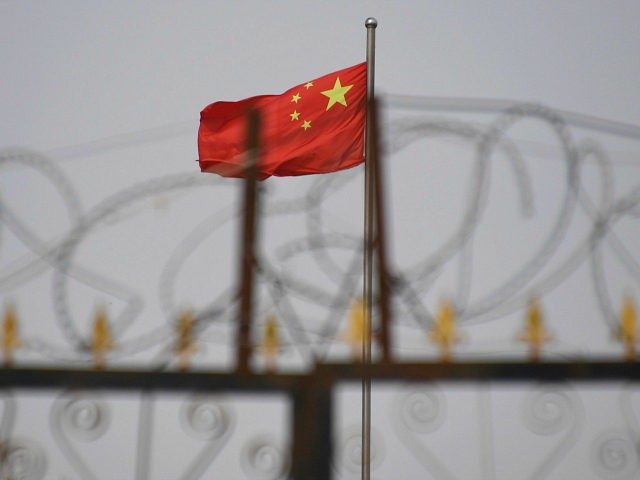The local Communist Party of Xinjiang, China — where authorities have built over 1,000 concentration camps to imprison millions of Uyghurs and other Muslims — claimed in remarks to the press Monday that Uyghurs who went missing there were guilty of “murder, rape,” and other crimes.
At their peak, American officials believed that the Xinjiang camps housed as many as 3 million people. The most recent estimate from the U.S. Commission on International Religious Freedom (USCIRF) stated that about 1.8 million people, mostly Uyghurs but some Kazakh and Kyrgyz Muslims also, were languishing in the camps as of April 2020. Chinese Communist Party authorities have described the camps as “vocational training centers” where Uyghurs learn important trade skills and explained the decline in inmate numbers by claiming many had “graduated” in December 2019. Three months later, a study by the Australian Strategic Policy Institute (ASPI) revealed that China had shipped many “graduates” into factories outside of Xinjiang to work as slaves, building products for dozens of international companies like Apple, Nike, and Nintendo.
Survivors of the camps have testified to extreme torture and indoctrination, as well as forced sterilization, abortions, and infanticide. Some say they witnessed the raping of camp prisoners, done before a crowd to intimidate the prisoners. Others say they were electrocuted. Chinese officials have derided eyewitnesses as criminals.
Similarly, Zulhayat Ismayil, a spokesperson for the local Xinjiang government, claimed Uyghurs demanding knowledge of their relatives at home may be seeking information on murderers and rapists, or their families may simply not like them.
“The possible reasons why some people have lost contact may be that some individuals from Xinjiang have been taking part in ‘East Turkistan’ terrorist activities after going overseas, which makes their relatives in China unwilling to contact them,” Zulhayat reportedly said, according to China’s state-run propaganda outlet Global Times.
The Times added Zulhayat’s claim that some of the missing had “committed crimes such as murder, rape, drug-dealing, robbery or other severe violations, and have been put under criminal detention.” China bans criminals from contact with the outside, she added, which did not explain why the government could not clarify to the relatives’ of those individuals that they were, in fact, in government custody.
The Global Times urged Uyghurs abroad to contact the Communist Party directly for information on their loved ones.
The Communist Party has regularly accused those exposing Beijing’s gross human rights abuses against ethnic minorities of being criminals, or otherwise defamed them as untrustworthy. Following testimony in the United States by a survivor of the camps, Mihrigul Tursun, Communist Party officials claimed that she had been arrested for “inciting hatred” and that she had contracted syphilis, the latter of which is not a crime in China.
In reality, Tursun was sent to a concentration camp after traveling to Egypt and getting married. Tursun has accused the Chinese state of killing one of her triplets, who were interned in the concentration camp with her, and of torturing her using starvation and electrocution.
Similarly, Chinese state media attacked Sayragul Sauytbay, another concentration camp survivor, as a criminal fraud who was fired from her job as a teacher for being incompetent. Sauytbay, an ethnic Kazakh, escaped to Kazakhstan and began to denounce Beijing’s concentration camps as early as 2018. She claimed to be imprisoned for traveling to Kazakhstan, like Tursun, and thus becoming a target of the state, but was forced to “teach” indoctrination at the camps before escaping. During her time there, she also maintains that she witnessed the use of an electric chair, as well as mass rape and other forms of torture.
There is no concrete number of confirmed Uyghur and other Muslim minority people that have gone missing in Xinjiang, with no confirmation that they ever spent time in a camp. Many of their relatives abroad have repeatedly condemned China for not clarifying the whereabouts of their relatives and banning them from speaking to their families. Radio Free Asia (RFA), a U.S. news service that employs many Uyghur journalists, reported this week that it had identified an unnamed source to confirm the location of at least one of the missing Uyghurs: Qasim Sidiq, and author and poet who went missing in 2017. Even this report, however, only narrowed down his status as alive and in “some form of detention,” without any details.
Similarly, in December, RFA revealed that Uyghur doctor Gulshan Abbas, who disappeared in 2018, was alive and suffering “a lengthy prison term” handed down in response to her sister Rushan Abbas’ activism for the Uyghur people abroad. Rushan Abbas worked as a reporter for RFA as part of her efforts to expose abuses against the Uyghur people; Gulshan Abbas has no history of activism against the Chihnese regime.
“We were recently notified by an informed source with access to sensitive information that my mother, Dr. Gulshan Abbas, was sentenced by the Chinese regime in March of 2019 to 20 years in prison on terrorism-related charges,” Ziba Murat, her daughter, told the outlet. “My mom is a medical professional, a nonpolitical kind of person who has spent her life helping people. The charges against her are preposterous, [as well as] the lack of any evidence or media coverage, the fact that the trial was closed and the highly unusual speed [of the hearing].”
China has claimed that all missing Uyghurs “are living normal lives” and hope their loved ones abroad “stop disturbing their peaceful life.”

COMMENTS
Please let us know if you're having issues with commenting.